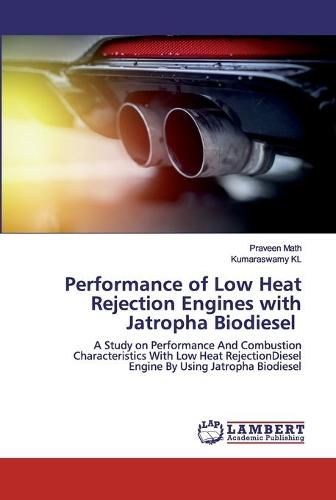Readings Newsletter
Become a Readings Member to make your shopping experience even easier.
Sign in or sign up for free!
You’re not far away from qualifying for FREE standard shipping within Australia
You’ve qualified for FREE standard shipping within Australia
The cart is loading…






This title is printed to order. This book may have been self-published. If so, we cannot guarantee the quality of the content. In the main most books will have gone through the editing process however some may not. We therefore suggest that you be aware of this before ordering this book. If in doubt check either the author or publisher’s details as we are unable to accept any returns unless they are faulty. Please contact us if you have any questions.
The income of petroleum as fuel is declining day by day and increasing demand of fuels, as well as the gradually more strict system, pose a face to science and technology. Use of vegetable oils in diesel engines leads to slightly inferior performance and higher smoke emissions due to their high viscosity. The performance of vegetable oils can be improved by modifying them through the transesterification process. Nowadays the performance of single-cylinder low heat rejection single-cylinder diesel engine by using Jatropha biodiesel as fuel was evaluated for its to improving performance and combustion characteristics. Jatropha is mixed with diesel fuel For Jatropha biodiesel and its mixed fuels, the outlet temperature of the engine is increasing with boost in brake power and amount of biodiesel. Calorific value and density were found. A dissimilar range of diesel engine and jatropha biodiesel/diesel ratios of 12/88% (J12), 18/82% (J18), 24/76% (J24), Jatropha 100%(J100) and diesel 100% by value are considered. Results indicated that J24 has a closer performance to diesel has lower brake thermal efficiency, mainly due to its high viscosity compared to diesel.
$9.00 standard shipping within Australia
FREE standard shipping within Australia for orders over $100.00
Express & International shipping calculated at checkout
This title is printed to order. This book may have been self-published. If so, we cannot guarantee the quality of the content. In the main most books will have gone through the editing process however some may not. We therefore suggest that you be aware of this before ordering this book. If in doubt check either the author or publisher’s details as we are unable to accept any returns unless they are faulty. Please contact us if you have any questions.
The income of petroleum as fuel is declining day by day and increasing demand of fuels, as well as the gradually more strict system, pose a face to science and technology. Use of vegetable oils in diesel engines leads to slightly inferior performance and higher smoke emissions due to their high viscosity. The performance of vegetable oils can be improved by modifying them through the transesterification process. Nowadays the performance of single-cylinder low heat rejection single-cylinder diesel engine by using Jatropha biodiesel as fuel was evaluated for its to improving performance and combustion characteristics. Jatropha is mixed with diesel fuel For Jatropha biodiesel and its mixed fuels, the outlet temperature of the engine is increasing with boost in brake power and amount of biodiesel. Calorific value and density were found. A dissimilar range of diesel engine and jatropha biodiesel/diesel ratios of 12/88% (J12), 18/82% (J18), 24/76% (J24), Jatropha 100%(J100) and diesel 100% by value are considered. Results indicated that J24 has a closer performance to diesel has lower brake thermal efficiency, mainly due to its high viscosity compared to diesel.